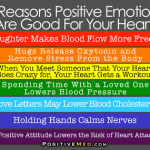36 Positive Emotions Enhance Well-Being
Based on Research by Frederickson, B.L.. Psychology Science Minute written by Stephanie A. Miloslavic, M.S
Think back to the last time you felt fear. Now think back to the last time you felt anger. Negative emotions often go hand in hand with specific actions or reactions. When people feel fearful, they often want to escape. When they feel anger, they often want to attack. Evolutionarily, these reactions can be adaptive. For example, if fearing danger, escaping a situation could save one’s life.
What actions usually result from positive emotions such as happiness or love? Dr. Barbara Frederickson reviewed research that suggests that positive emotions can serve four positive roles:
1) widen the array of thoughts and actions that come to mind, strengthening our problem solving ability,
2) undo or correct lingering after effects of negative emotions,
3) fuel resilience, so we can bounce back from stressful experiences quickly, and
4) build psychological resources likely enhancing our emotional well-being.
So experiencing positive emotions has long-lasting positive outcomes that transform us for the better. Thus, to maximize our effectiveness and well-being, we can ask ourselves, “What can I do to experience more happiness and love in my life?
Primary reference:
Fredrickson, B. L. (1998). What good are positive emotions? Review of General Psychology, 2, 300-319.
Frederickson, B. L. (2001). The role of positive emotions in positive psychology: The broaden-and-build theory of positive emotions. American Psychologist, 56(3), 218-226.





